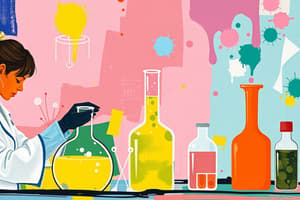Podcast
Questions and Answers
What should you do if chemical splashes in your eyes or on your skin?
What should you do if chemical splashes in your eyes or on your skin?
- Apply ointment immediately.
- Inform your lab partner.
- Cover the area with a cloth.
- Flush with running water from the eyewash station or safety shower for at least 20 minutes. (correct)
All chemicals in the laboratory are considered dangerous.
All chemicals in the laboratory are considered dangerous.
True (A)
What should you never do with unused chemicals?
What should you never do with unused chemicals?
- Share them with others.
- Store them for later use.
- Return them to their original containers. (correct)
- Dispose of them properly.
What should you check before removing contents from chemical bottles?
What should you check before removing contents from chemical bottles?
You should mix chemicals in sink drains for disposal.
You should mix chemicals in sink drains for disposal.
What should you do while using a burner?
What should you do while using a burner?
You should wait for instructions to clean all work surfaces and specific apparatus at the end of the ________.
You should wait for instructions to clean all work surfaces and specific apparatus at the end of the ________.
What should you do with your hands after performing all experiments?
What should you do with your hands after performing all experiments?
You should wait to be dismissed by the bell.
You should wait to be dismissed by the bell.
Make sure your workstation is clean and orderly as you found it, nicely prepared for you! Your safety depends on ________.
Make sure your workstation is clean and orderly as you found it, nicely prepared for you! Your safety depends on ________.
Flashcards are hidden until you start studying
Study Notes
Emergency Protocols
- Immediately get the instructor’s attention if a lab partner is hurt.
- In case of chemical splashes in eyes or on skin, flush with running water from an eyewash station or safety shower for at least 20 minutes.
- Do not touch broken mercury thermometers; handle with care.
- Report any chemical spills, fires, or gas leaks to the instructor.
Chemical Safety
- Treat all laboratory chemicals as potentially dangerous; avoid touching, tasting, or smelling unless instructed.
- Proper technique for smelling chemical fumes will be demonstrated by the instructor.
Chemical Handling Guidelines
- Check labels on chemical bottles twice before removing contents to ensure accuracy.
- Only take the amount of chemicals needed for the experiment.
- Do not return unused chemicals to original containers to avoid contamination.
Disposal and Waste Management
- Dispose of chemical waste properly; do not mix chemicals in sinks.
- Sinks are designated for water and instructor-approved solutions only.
Burner and Flame Safety
- Keep hands away from gas valves; do not tamper with them.
- Exercise caution when using burners; maintain a safe distance from flame with hair, clothing, and hands.
- Never place substances into the flame without explicit instruction.
- Avoid reaching over an exposed flame.
Clean-Up Procedures
- Wait for instructions before cleaning work surfaces and equipment post-experiment.
- Return all equipment in clean and functional condition to the designated area.
- Wash hands thoroughly with soap and water after all experiments.
General Lab Conduct
- Maintain a clean and orderly workstation, as it was prepared for you.
- Stay seated and wait for teacher dismissal rather than leaving when the bell rings, highlighting the importance of safety protocols.
Studying That Suits You
Use AI to generate personalized quizzes and flashcards to suit your learning preferences.




